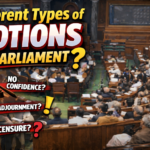Supreme Court: The governor of a state has to act on the recommendation of the council of ministers

The Supreme Court said that the governor of a state has to act on the recommendation of the council of ministers. It dismiss an appeal challenging the decision of the Madras High Court. HC refused to consider a petition against the continuance of V Senthil Balaji as a minister in the Tamil Nadu government despite his arrest. “Prima facie, the high court is right that the Governor could not have dismissed the minister said the court in the ruling.
ART 164
(1) There shall be a Council of Ministers with the Chief Minister at the head to aid and advise the Governor in the exercise of his functions, except in so far as he is by or under this Constitution required to exercise his functions or any of them in his discretion.
(2) If any question arises whether any matter is or is not a matter as respects which the Governor by or under this Constitution required to act in his discretion, the decision of the Governor in his discretion shall final, and the validity of anything done by the Governor shall not be called in question on the ground that he ought or ought not to have acted in his discretion.
(3) The question of whether any, and if so what, advice tendered by Ministers to the Governor shall not inquired into in any court.
Right from Shamsher Singh’s case in 1974, authored by seven judges of the Supreme Court. And subsequently in S R Bommai (1994) and Shivraj Singh Chouhan (2020). The law is that in this and other matters, the governor must act on the aid and advice of the Council of Ministers.
The Article sees value in the Governor’s post, both for constitutional and ceremonial functions. Talking about the proper process to appoint a Governor, a solution lies in drawing up a cadre of distinguished persons from different fields. Civil service, armed forces, academics, culture, respected former ministers and the like.
While there are cautions about judges, this could be obviated if it operates on a roster, and candidates aren’t chosen by the executive. There needs to be a cooling off period so that the attractions of the post do not deflect the person. And one term of five years should do. From this panel, a suitable name should picked in consultation with the chief minister. So that there no fear of a troublesome element being lodged in Raj Bhavan. One should look for a certain stature born out of accomplishment and integrity. A good governor is an asset to the state, straddling the federal divide.
LEARNING FROM HOME/ WITHOUT CLASSES/ BASICS
- The Sarkaria Commission, set up in 1983 to examine the Centre-State relationship on various points. Felt that the Chief Minister should consulted before appointing the Governor, for the proper working of the parliamentary system.
- The National Commission to Review the Working of the Constitution. “It would be appropriate to suggest a committee comprising the Prime Minister, the Home Minister, the Speaker of the Lok Sabha, and the Chief Minister of the State concerned to select a Governor.
- In Shamsher Singh v. State of Punjab, AIR 1974 S C 2192, the Supreme Court laid down definitely that the President and Governors are constitutional heads of Government like the Crown in England and must act on the advice of their Ministers.
Of late, the relationship between Governor and the State government has metamorphosed into a confrontation, with the governor either refuses to sign bills passed by the state assembly or issuing veiled intimidation to an elected government.
Nabam Rebia judgement. 2016 ruled that Article 163 does not give Governors a “general discretionary power” often misunderstood.






0 Comments